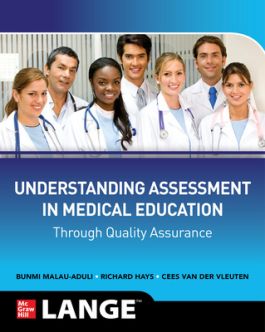Understanding Assessment in Medical Education through Quality Assurance
Receive via shipping:
- Print bound version of the complete text
Chapter 1: Quality Assurance of Assessment Processes
Orientation to the Chapter
Introduction
Rationale for Quality Assurance
Principles of Quality Assurance
Approaches to Quality Assurance
Quality Assurance Mechanisms
Avoiding Common Pitfalls
Conclusion
References
Chapter 2: Roles and Responsibilities of Quality Assurance Assessors
Orientation to the Chapter
Introduction
Assessment Expertise and Self-Awareness in QA Assessors
Interpreting Standards
The Importance of Assessment Expertise Within the Education Provider
Enhancing the Self-Evaluation of the Education Provider
When Further Evidence is Necessary
When Required Action is Necessary
Decision-Making in Quality Assurance
The Importance of Feedback and How to Deliver Feedback
Who Learns the Most from Participation in QA Processes?
Avoiding Common Pitfalls
Conclusion
References
Chapter 3: Quality Assurance of Written Assessment
Orientation to the Chapter
Introduction—Purpose of Assessment
Format of the Assessment
Quality Aspects in the Item Writing Process
The Do’s and Do Not’s of Item Writing
Pathways of Items in the Quality Assurance Process
Item Analyses
Conclusion
References
Chapter 4: Quality Assurance of Objective Structured Clinical Examinations
Orientation to the Chapter
Introduction
Quality Assurance Using the Kane Validity Framework
Other Quality Assurance Mechanisms and Issues
Conclusion
Appendix 4-1: Validity Framework: Workbook for an OSCE
Appendix 4-2: OSCE Quality Improvement Report
Appendix
4-3: External Reviewer, Examiner Report for OSCE
References
Chapter 5: Quality Assurance of Workplace Based Assessment
Orientation to the Chapter
Introduction
Culture Change
Feedback
WBA Implementation
Communication and WBAs
Avoiding Common Pitfalls
Monitoring and Evaluation
Conclusion
References
Chapter 6: Quality Assurance in Programmatic Assessment
Orientation to the Chapter
Introduction—Principles of Programmatic Assessment
Case 6-1—Cleveland Clinic Lerner College of Medicine (CCLCM)
Case 6-2—Maastricht University Physician Clinical Investigator
Program (PCI)
Case 6-3—Utrecht University Veterinary Medicine (FVMU)
Implications for Quality Assurance
Conclusion
References
Chapter 7: The Role of Technology in the Quality Assurance of Assessment Processes
Orientation to the Chapter
Introduction—The Increasing Role of Technology in Medicine
and Medical Education
How Technology is Impacting Foundational Tasks in Assessment
How Technology is Impacting Operations
Technology in Assessment—Prognostications and Confabulations
Conclusion
References
Chapter 8: Assuring Equivalence of Assessments across Settings
Orientation to the Chapter
Introduction—Why Might We Want Equivalence?
Understanding Equivalence
Contributors to Learner Assessment Results
Avoiding Pitfalls to Achieve Equivalence
Ways to Measure or Evaluate Equivalence
Conclusion
References
Chapter 9: Quality Assurance of an Assessment Program
Orientation to the Chapter
Introduction
Assessment Program’s Quality in Practice
Case 9-1: Assurance by Assessment Policy Plan
Case 9-2: Assurance by Using an Tool: E-Quality
Continuum of Theoretical Perspectives on Assessment Quality
Conclusion
References
Chapter 10: Quality Assurance of Assessment During Major Disruptions
Orientation to the Chapter
Introduction—Getting Back to “Normal” Business
Maintaining Enhanced Hygiene Practices
Maintaining Social Distancing Practices
Continued Travel Restrictions
Impact on Clinical Learning and Assessment
Timing
What About the Next Time?
Impact on Quality Assurance Processes
Technology
Conclusion
References
Glossary
Index
Optimize your assessment processes through Quality Assurance. This is a ground-breaking guide to ensuring quality assurance in the movement toward competency-based medical education
With the increasing globalization of medical education comes the need for mutual recognition of quality and standards. Understanding Assessment in Medical Education through Quality Assurance compiles and shares best practices from leading programs from around the globe. Authoritative approaches and processes that have been tested and refined show how to implement quality assurance of written, performance-and workplace-based assessments in medical education while maintaining regulatory standards.
As leading experts in the medical education world on this issue, the authors provide specific suggestions and showcase how their methods can be implemented with representative case studies. Medical educators and their students will benefit from this suite of evidence-based QA processes that they can immediately put into action for monitoring and ensuring continuous quality improvement.
Content highlights:
- The value of quality assurance (QA) and the role of QA assessors in assuring the quality of assessment
- International best practices in relation to quality assurance of programs of assessment, both within academic institutions and at national/international accreditation levels
- Quality assurance of Performance-based, workplace-based, written and programmatic assessment
- The role of technology in the quality assurance of assessment processes
- Approaches for assuring equivalence of assessment across diverse settings
- The ways in which medical education has changed in response to the disruption caused by the COVID-19 pandemic

